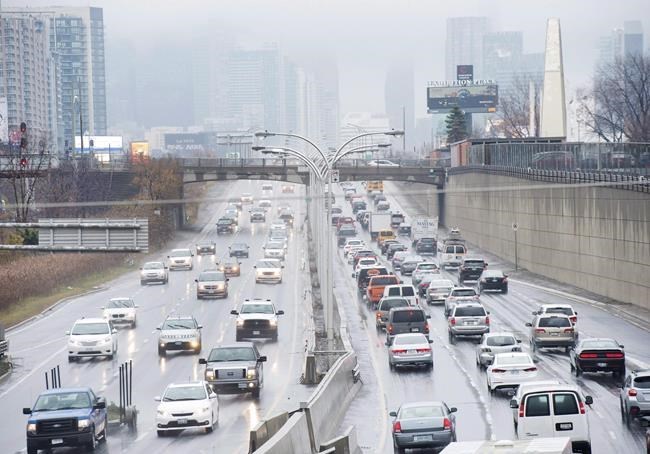
Vehicles makes there way into and out of downtown Toronto along the Gardiner Expressway in Toronto on Thursday, November 24, 2016. Workers at auto body shops deliberately damaged cars, installed used parts but billed for new ones, or invoiced for phantom repairs, according to an investigation by a Canadian insurer that is calling on government to help in curbing the problem. Aviva Canada found about half the total expenses submitted for repairs to crashed vehicles examined during its investigation in Ontario were bogus -- an amount the company estimates adds up to hundreds of millions of dollars a year. THE CANADIAN PRESS/Nathan Denette
March 11, 2018 - 8:00 AM
TORONTO - Workers at auto body shops deliberately damaged cars, installed used parts but billed for new ones, or invoiced for phantom repairs, according to an investigation by a Canadian insurer that is calling on government to help in curbing the problem.
Aviva Canada found about half the total expenses submitted for repairs to crashed vehicles during its investigation in Ontario were bogus — an amount the company estimates adds up to hundreds of millions of dollars a year.
"Nobody has ever really sampled the extent of fraud with any kind of accuracy," Gordon Rasbach, Aviva Canada's vice president of fraud management, said in an interview. "This is the first time in Canada that we're aware of that anyone has actually taken a sample, albeit a small one, at random, and used actual cases in progress to put some kind of numbers on it."
In its investigation — results are to be released on Monday — Aviva attempted to simulate typical fender-bender situations involving private passenger cars by deliberately crashing 10 vehicles.
The company had experts detail the damage and estimate repair costs, then kitted out the cars with hidden cameras and, at various times last year, put them on highways in the Toronto area. Investigators posed as hapless drivers just having gone through their first crash.
Rasbach said he was surprised only one repair outfit acted honestly. The other nine cases showed some degree of "clear cut" fraud, he said. While Aviva's experts had estimated total damage for the 10 vehicles at about $30,000, the repair shops invoiced Aviva for about $61,000, the company says.
Among other things Aviva says occurred were tow-truck drivers who billed for towing and storage that didn't happen, drivers who were asked to sign blank work orders, cars maliciously damaged at body shops, and shenanigans over repaired or replaced parts.
"The video footage and clear evidence of fraudulent invoicing shows just how pervasive the problem of fraud is," Rasbach said. "Honest consumers are the ones that are paying for it."
Insurance fraud eats into the bottom lines of companies like Aviva.
Industry estimates suggest between five and 15 per cent of premiums drivers pay for car insurance go toward covering undetected fraudulent claims. Aviva, whose own tactics in fighting legitimate claims have come under fire by the courts, says more has to be done to combat fraud. Among other things, it wants governments to force insurance companies to report and share information when fraud is identified.
"In Canada, insurers are not only not compelled to report fraud, they're not even compelled to do something about it," Rasbach said. "The insurers themselves don't seem to be able to get their act together on this problem."
Banning referral fees to third parties — for example a tow-truck driver who gets paid to take a vehicle to a specific facility — and making it illegal to ask consumers to sign blank work orders are other measures the government should take, Aviva said.
A spokeswoman for Ontario Finance Minister Charles Sousa said the government was making structural reforms to address fraud but did not comment on any of the ideas put forward by Aviva.
Ken Whitehurst, executive director of the Consumers Association of Canada, expressed skepticism the fraud is as extensive as claimed given that repairs are often done at body shops recommended by the insurance companies themselves. However, Aviva deserves some credit, he said.
"It's great that they are illustrating that (fraud) is really happening," Whitehurst said. "It's a positive thing that they're trying to come up with what they hope are low cost ideas (to address it)."
The Aviva study comes just months ahead of a provincial election in Ontario, where high auto-insurance premiums have been a perennial hot topic for decades. A report previously commissioned by the province found the average policy for a vehicle in 2015 was $1,458 — double that in Quebec and almost 55 per cent higher than the Canadian average.
That report, which focused on curbing sharply rising costs related to crash-related health-care benefits, prompted the province among other things to begin developing standard treatment plans. In addition, Ontario has announced plans to set up a "Serious Fraud Office" to combat fraud with a focus on auto insurance.
A previous Aviva investigation into a scam involving claims for accident-related health benefits in the Toronto area prompted a police probe that led to fraud charges against three people.
News from © The Canadian Press, 2018